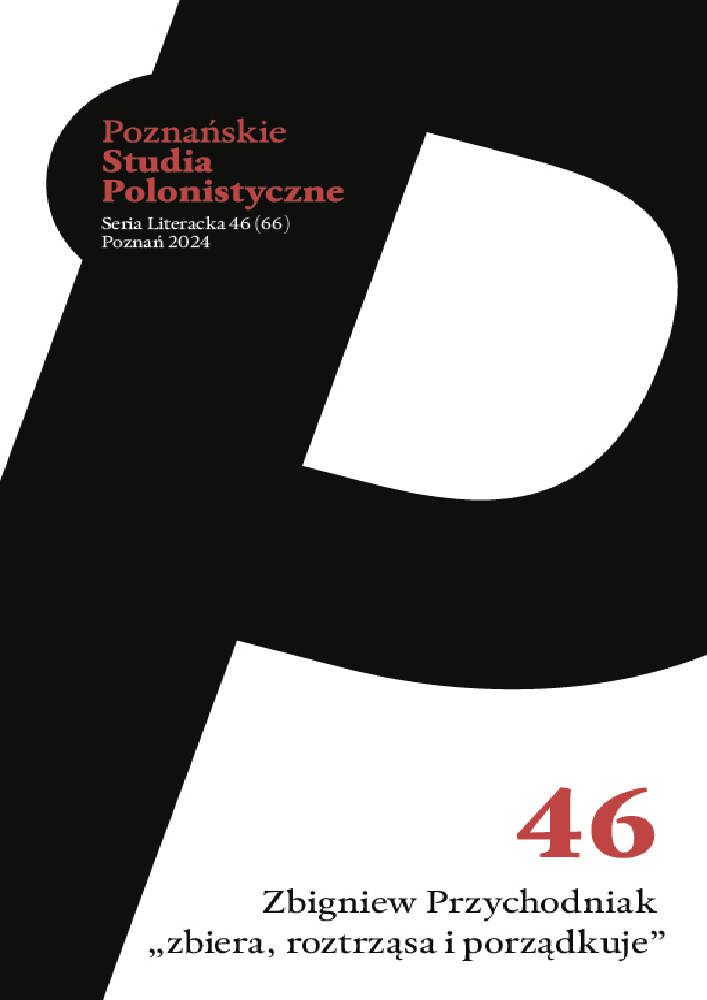Abstract
Based on the example of Byronic themes in Mickiewicz’s works from the 1830s, the author analyses the antinomies of Byronism’s receptions, focusing on the Great Improvisation as an archetypal scene within Polish romantic literature. Konrad’s improvisation expresses both the extreme solitude of the character and his deepest relationship with his community. The Great Improvisation is also a transgression in its multiple meanings. In this scene, we can see the peak of Polish Byronism as well as the end of Byronic influence. The dynamics of the Improvisation show that Mickiewicz’s Byronism cannot be treated solely in the categories of literary motifs, psychological construction or a set of ideas. In this case, Byronism is not merely a static collection of characteristics, but a dynamic construction, an activity full of tensions; it is a constant verification of ethical and religious values and ideals, if not a review of dogmas and traditions and the process of transgressing them in order not to arrive at nothingness and evil, but – as Mickiewicz put it – to “search for higher and fundamental truths.”
References
Dernałowicz Maria (1966), Od „Dziadów” części trzeciej do „Pana Tadeusza”. Marzec 1832 – czerwiec 1834, PIW, Warszawa.
Halkiewicz-Sojak Grażyna (1994), Byron w twórczości Norwida, TNT, Toruń.
Mickiewicz Adam (1997), Goethe i Bajron, w: tegoż, Dzieła. Wydanie Rocznicowe, Czytelnik, Warszawa, t. V.
Mickiewicz Adam (1998), Listy, cz. I. 1815–1829, w: tegoż, Dzieła. Wydanie Rocznicowe, Czytelnik, Warszawa, t. XIV.
Mickiewicz Adam (1998a), Przedmowa tłumacza, w: tegoż, Dzieła. Wydanie Rocznicowe, Czytelnik, Warszawa, t. III.
Sand George (1958), Eseje, tłum. Stanisława Kożuchowska i Maria Dramińska-Joczowa, PIW, Warszawa.
Siemieński Lucjan (1971), Religijność i mistyka w życiu i poezjach Adama Mickiewicza, Władysław Jaworski, Kraków.
Tatarkiewiczowa Anna (1964), Wstęp, w: Chateaubriand François-René, René, przeł. Tadeusz Boy-Żeleński, oprac. Anna Tatarkiewiczowa, Zakład Narodowy im. Ossolińskich, Wrocław.
Witkowska Alina (1983), Mickiewicz. Słowo i czyn, Państwowe Wydawnictwo Naukowe, Warszawa.
License
Copyright (c) 2024 Maria Kalinowska

This work is licensed under a Creative Commons Attribution-NoDerivatives 4.0 International License.
Authors
Authors of texts accepted for publication in „Poznańskie Studia Polonistyczne. Seria Literacka” are required to complete, sign and return to the editor's office the Agreement for granting a royalty-free license to works with a commitment to grant a CC sub-license.
Under the agreement, the authors of texts published in „Poznańskie Studia Polonistyczne. Seria Literacka” grant the Adam Mickiewicz University in Poznań a non-exclusive, royalty-free license and authorize the use of Attribution-NoDerivatives 4.0 International (CC BY-ND 4.0)Creative Commons sub-license.
The authors retain the right to continue the free disposal of the work.
Users
Interested Internet users are entitled to use works published in „Poznańskie Studia Polonistyczne. Seria Literacka” since 2016, for non-commercial purposes only, under the following conditions:
- attribution - obligation to provide, together with the distributed work, information about the authorship, title, source (link to the original work, DOI) and the license itself.
- no derivatives - the work must be preserved in its original form, without the author's consent it is not possible to distribute the modified work, such as translations, publications, etc.
Copyrights are reserved for all texts published before 2016.
Miscellaneous
Adam Mickiewicz University in Poznań retains the right to magazines as a whole (layout, graphic form, title, cover design, logo etc.).

